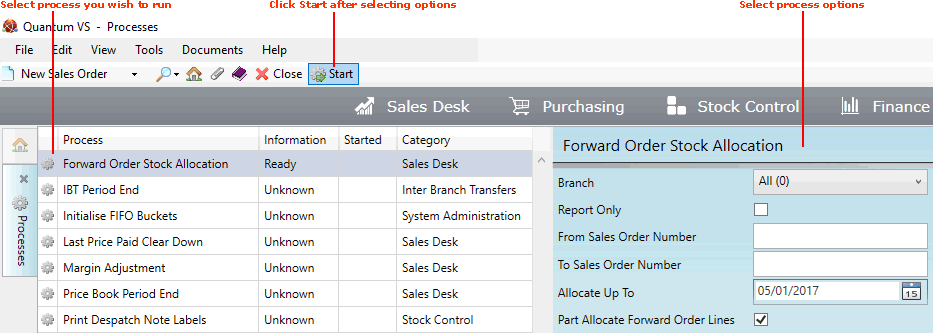From the Home tab: under links, select Processes.
|
Quantum VS Help: File Maintenance |
The Forward Order Stock Allocation process is used to (a) allocate (i.e. release) stock - if available - to 'Forward' Sales Order lines based on their Allocation Date; or (b) compile a report of Forward Order lines, based on the criteria you enter. For further details see Forward Orders.
Note: The Forward Order Stock Allocation process can be used to report on and release stock both to legacy Forward Orders and Forward Order lines (as introduced in Quantum VS 9.0.1.8). See Forward Ordering In Quantum VS: The Old And New Systems.
Note: When a Forward Order line has an Allocation Date of 'today', stock is allocated (force released) to the line on Sales Order Completion if available, meaning it is not necessary to run the Forward Order Stock Allocation process.
Note: The Forward Order Stock Allocation process was formerly known as the Bulk Forward Order Allocation process. Prior to this it was known as the Bulk Forward Order Release process.
As well as allocating stock to the Forward Order line, running the Forward Order Stock Allocation process will also generate a Picking Note for the line - assuming stock is available - if the line's Required Date is within the Process Days Prior To Required parameter (in the Price Book General: Selling tab). This enables the order/line to progress through the Picking/Despatch process, subject to the User's 'Order Flags' settings in their User record.
If the line's Required Date is not within the Process Days Prior To Required parameter, running the Forward Order Stock Allocation process will allocate stock to the Forward Order line (if available), but will not generate a Picking Note. In this case it will be necessary to run the Forward Order Document Release process on a later date to generate the Picking Note.
For further details and examples see Forward Order Lines: Allocating Stock And Releasing Lines For Picking/Despatch.
To run the Forward Order Stock Allocation process:
1. Either:
From the Home tab: under links, select Processes.
Or: From the Toolbar - Main Menu: select Tools > Show Processes.
OR: Click the appropriate module on the Mega Menu then - under processes - select the required Process.
The Processes record opens in a new tab, listing all Processes by Name and Category.
2. Use your mouse or [Tab] key to select the Forward Order Stock Allocation process:

3. Select process options in the available fields as required, using the following as a guide:
Note: You may use your [Tab] key to move from one field to the next.
|
Field |
Definition
|
|
Branch
|
Use the menu to select the Branch this process will apply to. Select All to run the process on all Branches.
|
|
Report Only
|
Leave this field unchecked if you want this process to allocate available stock to Sales Orders/order lines for which the Allocation Date has been reached.
Check this field if you want the 'report only' version of the process; i.e. the process will produce a report of Sales Orders/order lines for which stock can be allocated, rather than actually allocating the stock to those orders.
Checking this field enables some additional fields below.
|
|
From / To Sales Order Number
|
You may optionally use these fields to restrict the range of Sales Orders considered for inclusion in the Forward Order Stock Allocation process. If necessary, enter the first and/or last in the required range of Sales Order numbers.
If these fields are not used, the process will consider all Sales Orders for inclusion - subject to other process criteria entered.
If you don't know the Sales Order number you may enter it automatically using the Finder. To do this:
|
|
Allocate Up To |
When the process is run, stock will be allocated/released to 'Forward' lines with an Allocation Date on or before the date entered in this field.
Today's date is entered by default, but you may select/enter an alternative.
|
|
Part Allocate Forward Order Lines
|
This controls what happens when there is insufficient stock of a line to allocate the required quantity. If this field is:
For example, the Product line 'TILES01' has reached its allocation date. The ordered quantity is 50 units but only 20 units are in stock on the allocation date. If Part Allocate Forward Order Lines is selected, on completion of the process the available 20 units will be allocated/released to the order line, while the remaining 30 units will be placed on back order. If Part Allocate Forward Order Lines was not selected, no stock of TILES01 would be allocated, even though potentially 20 units are available.
Note: Ability to see/use this feature is control by the following User Permission: Sales Desk > Forward Orders > Part Allocate Default. |
|
Check Stock
|
Displays if Report Only is selected:
Check this field if you require the report to show stock availability.
|
|
Stock Exceptions
|
Displays if Report Only is selected:
|
|
From / To Required Date
|
Displays if Report Only is selected:
The report will list Forward Orders/lines based on their Required Date.
Today's date is entered by default, but you may select/enter an alternative date range (e.g. show Forward Order lines with a Required Date from 01/01/20XX to 31/01/20XX).
|
4. Click Start on the Toolbar - Sub Menu to begin running the process.
5. When the process has finished running, a Status message will be shown listing a URL at which a report can be viewed and printed if necessary. Click OK to close this message. You may now close the Processes tab if you wish.